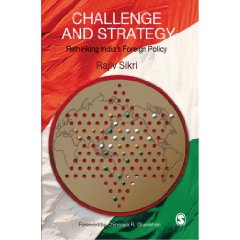Challenges and Strategy: A new book argues for a rethink on India’s foreign policy
 New Delhi, May 8: If India has to become a major player in the 21st century, a major reappraisal of India's foreign policy is needed.
New Delhi, May 8: If India has to become a major player in the 21st century, a major reappraisal of India's foreign policy is needed.
This is the argument of a new book "Challenge and Strategy: Rethinking India's Foreign Policy by Rajiv Sikri.
The former diplomat in his lucidly written book examines India's current and looming foreign policy challenges from a strategic and policy oriented perspective.
The stated objective of the book is "to spread awareness of India's foreign policy challenges in the 21st century by stimulating an informed debate on India's foreign policy options among Indians, particularly the younger generation."
The book contends that "India is no longer a pawn on the world stage; it is also a player", and the new generation of India doesn't want the country to be in the category of "also-ran", it wants the nation to be a "major player in the emerging global scenario".
"Challenges and Strategy" sees the emerging foreign policy challenges from the perspective of history. It believes that "a new stable balance of power and a new pattern of inter-state relations" have not yet emerged after the gradual death of the post World War Two international order.
The author thinks that the present world order looks as chaotic as Europe looked after the French Revolution of 1789 and it may take another decade or so for the incipient trends in the global balance of power to get consolidated and for the pieces of the "new global kaleidoscope to fall into place".
In this "disorder" there is doubt about the "global weight" of America in the new emerging order; there is also uncertainty about the dominance of China in the 21st century as the author believes that its economic miracle could run out of steam".
Sikri sees Russia coming out of the shadow of the post-Cold War era in the 21st century.
The former diplomat asserts that the "fulcrum of global politics and economics is inexorably shifting towards Asia" and "Vasco da Gama era of Asian history is coming to an end after five centuries".
In this changing international scenario the global standing of India in the 21st century will depend to a large extent on whether India lives up to its promise and potential, whether China manages to sustain its economic growth, and inter-relationship between the two giants.
Sikri underlines the changing foreign policy dynamics and perspective in India. He calls the no confidence motion in parliament in 2008 on the issue of Indo-American nuclear deal as a "huge turning point for a country that is sometimes suspected of not even having a foreign policy".
The book delves deep into the history and the need for India to rethink anew and in a new light the foreign policy of India.
The book claims to be "a must read" for policy makers, diplomats, foreign policy analysts and students of Indian politics and relations.
Rajiv Sikri was a career diplomat for over 36 years and retired as a Secretary in Ministry of External Affairs with responsibility for India's relations with the Asia-pacific region, the Arab world, Israel, Iran and Central Asia. (ANI)